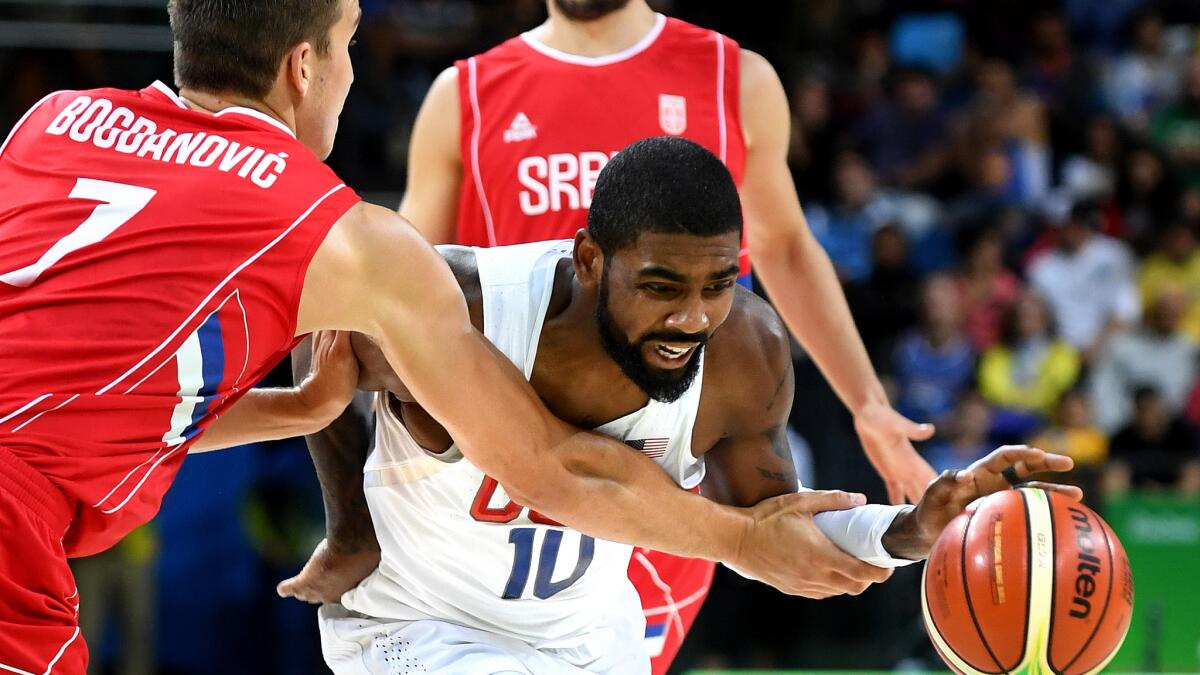U.S. men’s basketball has perfect record amid imperfect play

- Share via
Reporting from Rio de Janeiro — If Team USA’s narrow victory over Australia on Wednesday was considered a scare, then Friday’s game against Serbia was a full-length Hitchcock feature.
Serbia’s Bogdan Bogdanovic had a clean look at a potential game-tying shot in the final seconds, but the ball fell short and allowed Team USA’s heart to start beating again in a 94-91 victory for the Americans.
With the win, the U.S. remains a perfect 4-0 in preliminary play, but one thing is coming clear: if the U.S. is going to win its third consecutive gold medal, the team will have to earn it.
Even with megastars such as LeBron James and Stephen Curry staying home, the U.S. was still a heavy favorite for gold given the depth of NBA All-Star talent on the roster.
Despite the U.S. racing out to a 23-5 lead in the first quarter, Serbia was steadfast in chipping away at the lead and exposed multiple issues of concern going forward for the U.S.
“Can we play better? I hope,” coach Mike Krzyzewski said. “I think we can.”
It didn’t sound like a big vote of confidence.
A look at the last two offensive possessions showed that the U.S. is lacking chemistry in half-court offense. Both possessions resulted in a player — first Kyrie Irving, then Paul George — dribbling one-on-one to create his own shot and missing, a type of play derisively known as “hero ball.”
“The toughest part is each and every one of us is confident with the ball in our hands that we can make those shots,” George said. “It just comes down to a trust factor, not letting one guy have that feeling that he has to do it alone.”
Meanwhile, two players from the Golden State Warriors, who feature a more ball-movement oriented offense — Draymond Green and Klay Thompson — combined for just three points. It was Irving, a player who works best with the ball in his hands, who led the U.S. with 15 points.
Defensively, the U.S. was terrible against Australia and Serbia trying to defend their motion offenses filled with back cuts and slip screens. Blame those breakdowns on a lack of communication from a team that isn’t used to playing this much defense.
“At times we get lazy because we’re so athletic and we got so many guys that can do multiple things that we don’t talk the way we’re supposed to,” guard Jimmy Butler said.
Superior talent and athleticism was just enough for the U.S. to skip past Serbia, which got 25 points from Denver Nuggets forward Nikola Jokic. But as the U.S. is learning, it can’t keep relying on that athleticism.
“As good as we are, if we continue to keep playing like this, these games are going to get even tougher,” George said.
That begins Sunday with France and a roster that features several NBA players such as Tony Parker of the San Antonio Spurs and Nicolas Batum of the Charlotte Hornets. With a win in the final preliminary game, or a loss by Australia to winless Venezuela, the U.S. will finish first in Group A heading into Wednesday’s quarterfinals.
If the U.S. stays in its current malaise, it may be in for an even bigger fright in the knockout rounds.
Twitter @ChristopherHine
More to Read
Go beyond the scoreboard
Get the latest on L.A.'s teams in the daily Sports Report newsletter.
You may occasionally receive promotional content from the Los Angeles Times.




